Keynotes and Master Lectures
Keynotes
Robert Winn, MD
When: Thursday, March 14 at 10 a.m.
Proudly Sponsored By Virginia Commonwealth University and Massey Comprehensive Cancer Center

This presentation will showcase the importance of understanding social drivers of health and evaluating disparities in the health outcome to ensure a more equitable and accessible health care system for everyone.
As director of VCU Massey Comprehensive Cancer Center, Robert A. Winn, MD, oversees a cancer center designated by the National Cancer Institute. The center provides advanced cancer care, conducts groundbreaking research to discover new therapies for cancer, offers high-quality education and training, and engages with the community to make advancements in cancer treatment and prevention equally available to all. He is leading the nation in establishing a 21st-century model of equity for cancer science and care, in which the community is informing and partnering with Massey on its research to best address the cancer burden and disparities of those the cancer center serves, with a local focus but global impact.
Bernard Fuemmeler, PhD, MPH, FSBM
When: Thursday, March 14 at 4 p.m.
Proudly Sponsored By the Virginia Commonwealth University School of Medicine
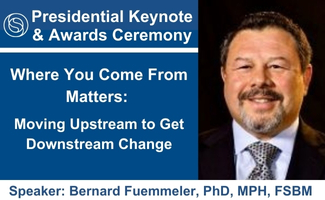
Where you come from matters. This is true of the diversity of backgrounds we bring to the field but also to the ways in which upstream factors shape the health of our society. Join Society of Behavioral Medicine (SBM) President Bernard Fuemmeler, PhD, MPH, FSBM, as he discusses the importance of how advancing an inclusive workforce and focusing on upstream factors and multilevel drivers will help us tackle one of the most imperative challenges of our time: improving health equity for all.
Dr. Fuemmeler has been a member of the society for more than 20 years. He is a professor and Gordon D. Ginder, MD, chair in cancer research in the Department of Family Medicine and Population Health at Virginia Commonwealth University (VCU). He serves as associate director of population science at VCU’s Massey Comprehensive Cancer Center. He also directs the Massey’s National Cancer Institute-funded T32 cancer prevention and control and cancer health equity training program.
George Loewenstein, PhD; and Katherine Milkman, PhD
When: Friday, March 15 at 10 a.m.
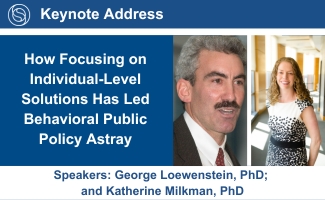
Many behavioral scientists propose and test policy interventions that seek to ‘fix’ problems with individual behavior (adopting an “i-frame”) rather than addressing the system in which individuals operate (an “s-frame”). The impact of such i-frame interventions has been disappointing and can reduce support for much-needed systemic reforms. Highlighting individual responsibility for societal problems is a long-established objective of corporate opponents of s-frame policies such as regulation and taxation. Thus, researchers advocating i-frame solutions may have unwittingly promoted the interests of the opponents of systemic change. Behavioral scientists can best contribute to public policy by employing their skills to develop and implement value-creating system-level change.
Dr. George Loewenstein is the Herbert A. Simon University Professor of Economics and Psychology at Carnegie Mellon University, and currently hold visiting professor positions at the London School of Economics and Political Science, the Arctic University of Norway (in Tromsø, Norway), and at the BRIQ Institute on Behavior and Inequality, at the University of Bonn, Germany. He served on multiple National Academy of Science and Institute of Medicine Panels, and have advised numerous corporations and governmental organizations, including the NIH, USDA, U.K. Behavioral Insights Team, CVS Caremark, Ascension Health, McKinsey, NPD, Aramark, and many others. He has also served on and chaired over 40 doctoral committees and taught intensive courses in behavioral economics at universities around the world.
Dr. Katherine Milkman is the James G. Dinan Professor at The Wharton School of the University of Pennsylvania and holds a secondary appointment at Penn’s Perelman School of Medicine. Her research explores ways that insights from economics and psychology can be harnessed to change consequential behaviors for good, such as savings, exercise, student achievement, vaccination and discrimination.
Megan Ranney, MD, MPH, FACEP
When: Friday, March 15 at 4 p.m.
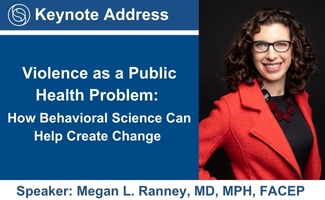
The United States had more mass shootings than days of the year in 2022, and firearm injury has overtaken car crashes as the leading cause of death for American children. Meanwhile, our youth — particularly young women and sexual- and gender-minority youth — are reporting unprecedented rates of depressive symptoms and suicidal thoughts. In this talk, Dr. Ranney will present work that illuminates the current state of knowledge on physical, digital, and firearm violence and co-occurring disorders (such as depressive symptoms and substance use disorder). She will discuss novel approaches, drawn from her and others’ work, to studying, preventing, and treating these interdependent crises across the social-ecological model, with a focus on the role of behavioral science in measuring and mitigating harm. Attendees will leave with clarity on what we know, what we don’t know, and where we need to move faster.
Dr. Megan L. Ranney is an emergency physician, researcher, and national advocate for innovative approaches to public health. She joined Yale in July 2023 as the Dean of the Yale School of Public Health and C.-E. A. Winslow Professor of Public Health. Dr. Ranney’s research focuses on developing, testing, and disseminating digital health interventions to prevent violence and related behavioral health problems, as well as on COVID-related risk reduction. She has held multiple national leadership roles, including Co-Founder and Senior Strategic Advisor for the American Foundation for Firearm Injury Reduction in Medicine (AFFIRM) at the Aspen Institute, a nonprofit committed to ending the gun violence epidemic through a non-partisan public health approach, and Co-Founder of GetUsPPE, a start-up nonprofit that delivered donated personal protective equipment to those who needed it most.
Heather Cole-Lewis, PhD, MPH
When: Saturday, March 16 at 10 a.m.
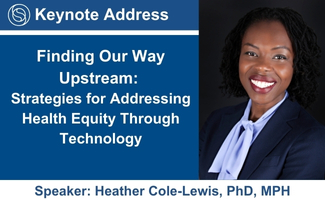
This presentation will provide practical strategies for addressing health equity through technology interventions and products, leveraging techniques and approaches from social and behavior science.
Dr. Heather Cole-Lewis is passionate about improving health by understanding people in the context of their lives. She is an expert in the design and evaluation of digital health interventions, with a specific focus on maximizing impact using rapid iteration and unique combinations of methodologies from social science, human computer interaction, and data science. Dr. Cole-Lewis has led digital health efforts in multiple sectors- Tech, Pharma, MedTech, Consumer Packaged Goods, Startups, Government consulting, and Global Health Development, providing strategic business and scientific guidance on products, research, and partnerships that influence health.
Master Lectures
Jennifer Kue, PhD
When: Thursday, March 14 at 2 p.m.
Dr. Jennifer Kue is an Associate Professor in the College of Nursing at the University of South Florida. With over 20 years of experience, Dr. Kue is an expert in community health promotion, cancer control and prevention, health equity, qualitative and mixed-methods research, and health program planning and evaluation. Dr. Kue's research is widely recognized for its application of community-engaged research principles to understanding and addressing cancer health disparities among medically underserved populations, including refugees and immigrants.
Mark L. Hatzenbuehler, PhD
When: Thursday, March 14 at 2 p.m.
Proudly Sponsored by UPMC Health Plan
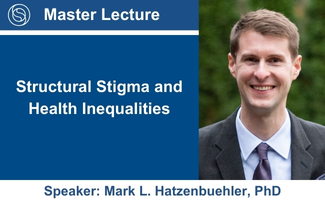
The field of behavioral medicine has long been interested in examining the health consequences of stigma; however, this work has been criticized for focusing almost exclusively on individual and interpersonal stigma processes to the exclusion of structural factors that generate and promulgate stigmatization of marginalized groups. In this talk, Dr. Hatzenbuehler will review several studies from our research group that use a multi-measure, multi-method, and multi-outcome approach to document the negative health consequences of exposure to structural stigma, and he will discuss implications of these findings for health interventions.
Dr. Mark L. Hatzenbuehler’s research focuses broadly on identifying the biopsychosocial mechanisms that contribute to adverse mental health outcomes among minority group members, with a particular focus on the role of stigma in shaping the development and maintenance of psychopathology. His research has been funded by the National Institutes of Health, the Centers for Disease Control and Prevention, and the William T. Grant Foundation. He has received several early career and distinguished scientific contribution awards from the Society for the Psychological Study of Social Issues, the American Psychological Association, and the Association for Psychological Science.
Neil A. Lewis Jr., PhD
When: Friday, March 15 at 11 a.m.
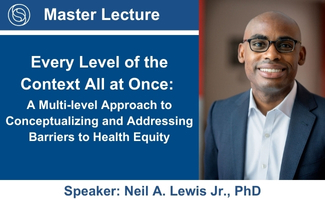
In this talk, Dr. Neil A. Lewis Jr. will discuss research on how multiple features of social contexts differentially impact people’s health outcomes (and disparities in those outcomes), and what those findings mean for efforts to improve health equity.
Dr. Neil A. Lewis Jr. is a behavioral scientist who studies how social interventions and policies can motivate behavioral changes to promote equitable outcomes in society. Lewis is an associate professor of communication and social behavior at Cornell University, and assistant professor of communication research in medicine at Weill Cornell Medicine. He also co-directs Cornell’s Action Research Collaborative, an institutional hub that brings together researchers, practitioners, community members, and policymakers to collaborate on projects and initiatives to address pressing equity issues in society.
Barbara Andersen, PhD
When: Friday, March 15 at 2 p.m.
Dr. Barbara Andersen is a clinical psychologist who studies biobehavioral aspects of cancer. Dr. Andersen conducts interdisciplinary, biobehavioral research, studying patients with breast cancer (regional, recurrence), chronic lymphocytic leukemia and advanced non-small cell lung cancers. Her passion is developing and testing psychological interventions to reduce stress and depressive symptoms and psychological and disease related morbidities to improve patients’ quality of life, health and cancer survival.
Ana P. Martinez-Donate, PhD
When: Friday, March 15 at 2 p.m.
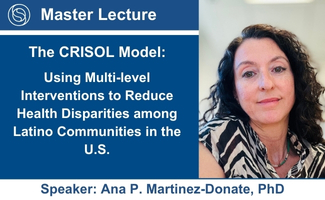
This presentation will introduce the CRISOL model, a community-based, multi-level intervention approach to address syndemics that disproportionately burden underrepresented communities in the U.S. Drawing on her community-engaged research work, Dr. Martinez-Donate will illustrate the application of this model to reduce disparities in COVID-19, substance use, HIV/AIDS, violence, and mental health and to promote health equity for Latinos in Philadelphia, PA.
Dr. Ana P. Martinez-Donate is a professor of Community Health and Prevention in the Dornsife School of Public Health at Drexel University, joining the School in September 2015. Martinez-Donate's research work has focused primarily on Latino populations in the U.S. and Mexico. She applies a social ecological framework to the analysis of behavioral and social determinants of population health and the development and evaluation of community-based interventions for disease prevention and health promotion.

